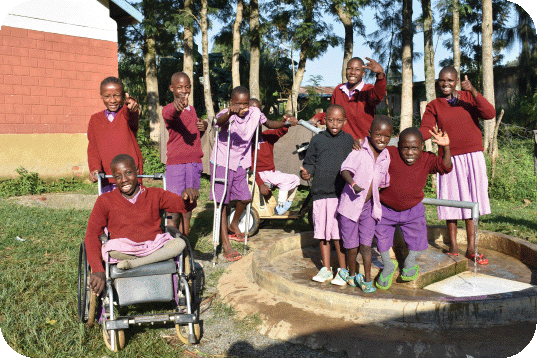Water for the Disabled: Restoring Human Dignity

The image of a young child kneeling down next to a tiny, contaminated, muddy pool of water to take a drink will never be washed from my mind, even though it’s been nearly fifteen years since we’ve lived in Mozambique. Gaining access to safe water was an ever-present struggle for most people where we lived, like it is in various parts of the world and especially in sub-Saharan Africa. The infrastructure needed for people to have safe, reliable water was just not in place, especially since Mozambique was still recovering many years after a brutal civil war. Even my family, who were privileged to have far more resources available, worked hard to have sufficient water every day.
Occasionally that memory feels like a burden, something I wish I could erase, but most days, I count it as a gift that opened my eyes and my heart a little wider. It is a consistent reminder that every human being is bestowed an inherent dignity by their creator and has a right for their basic human needs to be met.
To me, that inherent dignity means all people, regardless of their limitations, are born to belong to the greater human family, and if that is true, then every person in that family deserves access to water. Sadly for disabled persons, the lack of adequate, accessible water, sanitation and hygiene (WASH) facilities around the world is glaring.
Without true access to water, everything is harder, especially for the disabled. It limits disabled people’s ability to practice proper sanitation and hygiene, which puts their health at greater risk. Their ability to live independently is reduced, making them dependent on others for their everyday living. As a result, these things often cause their sense of dignity to be minimized. At The Water Project, we believe every person in a community, regardless of ability, deserves water and for that I am grateful.
In my everyday work as a report writer, I see firsthand all of the detailed reports and photos of both the needs and the work on the ground in the areas where we serve. The photos of communities still needing a water solution often break my heart, but then the photos of community members celebrating their new projects that bring water and a better life cause me to smile and celebrate.
In the last year, I’ve come across a few of our partners’ reports that have made my smile grow even wider than normal and when I do, I sense my heart whispering, “This is what it is all about.” The reports that have most caught my attention this past year have been those chronicling the journey of persons with disabilities gaining water.
One such report follows the story of George Sankoh, who is a local school teacher, a father, and husband to a wife who is also living with disabilities in New London, Sierra Leone. When we first met him, he was struggling to independently care for himself and felt like a burden to the children he relied on for water.
“Having access to safe and clean water at my doorstep will transform our entire family and the community. My children are still too young to be fetching water from far distances, and with our condition, we rely on the children of relatives.” – George Sankoh.
But when a new well was drilled in his community last year, built specifically to allow those with disabilities to access it, things changed for George and his wife. Now they can both confidently collect water for themselves and no longer feel a sense of indignity surrounding water.
“Considering our condition, it was exceedingly difficult for us to get access to a water source that is disabled-friendly. Today, it is a privilege for us to get a safe, reliable, and disabled-friendly water point at our doorstep. I do not know how to express the joy I have within me for having such an opportunity in my community. It has reduced the burdens on my children because I myself can easily come in [to] the well and fetch water for myself.” – George Sankoh.
You can read more of George’s story here.
As for me, I continue to appreciate that I get to play a very small part in the solution by bringing the stories of the people we serve to life online. And with every report I write, I continue to hope for a better future for all, regardless of ability, and celebrate that dignity is being restored to our brothers and sisters across the globe through our work together.
Home More Like ThisTweet